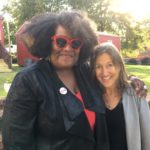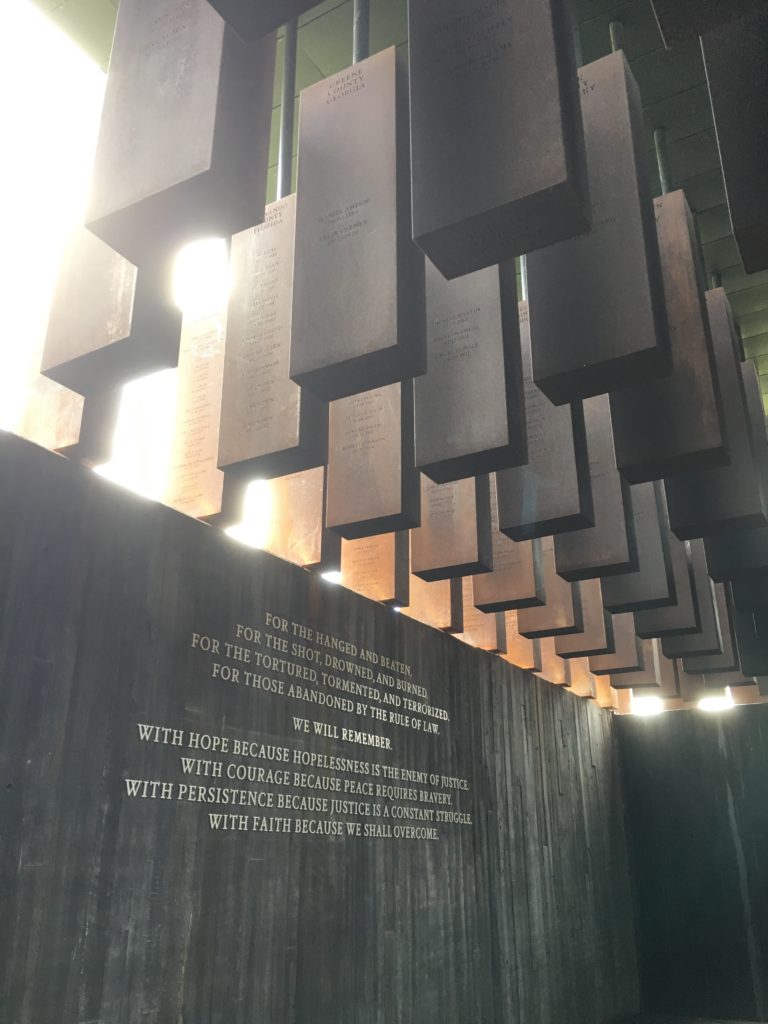Truth Be Told – Montgomery
On her MoreThanTours, Michelle Browder tells the truth. She starts on the banks of the Alabama River where the lands of the Alabama Tribes were stolen, by hostility or trickery: Apache, Caddo, Alabama-Quassarte, Chickasaw, Choctaw, Arapaho, Cherokee, Cheyenne. Where black American slaves were marched from ships to storehouses to market. People descended from the Africans stolen into involuntary servitude.
After 1808, when stealing people from outside our country was banned, domestic trade sustained the brutality of enslavement. People from around the U.S. were marketed through Montgomery.
Michelle tells this truth. And then she conveys the charge.
Here we are, living all together. The task is ours – to look after the dignity and wellbeing of each and every one.
The truth – this truth of stolen land, of slavery – is hard to take. But more and more, Michelle is hearing people say, “Thank you for telling it straight. Thank you for respecting us with what really happened.” No sugar coating. No softening the blow.
And blown out we are – all in different ways, depending on how and where we were raised, depending on whether we were born black or white or brown.
All of us know that race remains an issue. Even if we, or our public leaders pretend it isn’t.
One of our most difficult challenges as American people shows up every day in our differences. We define ourselves by the stories we tell of the people we’re not. We take as reliable the smallest signs of political difference, of things we call “elitism” or “deplorable.” But without any effort at all, we see race. And the stories underlying the meaning America places on skin color are stitched deep into the fiber of how any of us makes sense.
Today I spent in Montgomery, Ala. I was with my mom and husband – two white people like me. We visited the National Peace and Justice Memorial where the lynching deaths of over 4000 people are acknowledged. It is a place of mourning, of grief, of telling the truth. Of feeling the awkward uncertainty of how to be, now. White people feeling the weight of this real and present legacy – not knowing what making amends means or how it looks in action. Black people seeing public validation of the pain they carry, from the fact of racism – racism seeded in their ancestors’ brutal extraction from home in Africa, and in the trading of their grandparents and great-grandparents domestically like farm animals.
This could only have happened within a constructed and maintained lie that, when it comes to people, some are more entitled to freedom and dignity than others.
Look at that sentence.
There are too many ways it applies, but today, in Montgomery – every day in Montgomery and throughout the entire country, there persists a deeply unconscious story that threatens our humanity. A story that has, in our history and in events around us every day, shown up as the most hideous of human indecency. In the late 1800s, early 1900s – the lynching of innocent people. Today, the grossly disproportionate imprisonment of black men and women and the police killings of one innocent black citizen after another.
Those of us who are not black do not wake up wondering if we will be shot dead before we come home in the evening. Because of our skin color, the thought doesn’t have to cross our minds.
In that way, the lie of some people being more important than others persists. We white people don’t have to do anything about it. Our opposition to racial brutality is an option. We don’t have to respond. Our necks aren’t on the line. “Yeah – it’s awful and everything, but what can I do? I didn’t own slaves. It’s not my fault.”
And we keep running that until we really listen. Until we see that, not only could it be us – it was. It’s still us – watching, saying and doing nothing. And in markedly different circumstances, it is many – maybe most – of us terrified, without defense. It is possible to understand the horror of lynching and other terrorism – the cruelty of our own bodies demolished for someone else’s furious insecurity. And the hardest part: It has been and still is too many of us who, furiously afraid, become the active tormentors.
None of this feels good. It shouldn’t.
But it is time to listen. It is time to feel. Time to grieve. To grow in that wisdom and to act.
Go to Montgomery. Spend time with Michelle Browder on her uncommonly truthful tours. Listen to the  dignity her words support – the clarity with which our history gives us graphic instruction. Do not kill. Do not steal. Do not covet or exploit. Instead listen. The brilliance is everywhere at hand to repair tormented and tormentor. The practice is kindness. It’s actually the trait most
dignity her words support – the clarity with which our history gives us graphic instruction. Do not kill. Do not steal. Do not covet or exploit. Instead listen. The brilliance is everywhere at hand to repair tormented and tormentor. The practice is kindness. It’s actually the trait most  central to human nature.
central to human nature.
But. Do not believe me.
You shouldn’t. Yet, do consider that grief is normal and necessary. That it is a process that is long and that is not paralysis. Rather, grief is necessary to go through even as we act to stop the terror – act to reclaim kindness. Grieve and act we must. Alone and together.
Go to Montgomery. Go to the National Memorial for Peace and Justice. Go to the Legacy Museum. Grieve. Let the story sink way in. It’s just the truth.
The question from here – how do we go forward with each other now? What do we want for ourselves and our country?
Together – with everyone living here, living now on this land.
 Clare Consultation, LLC
Clare Consultation, LLC